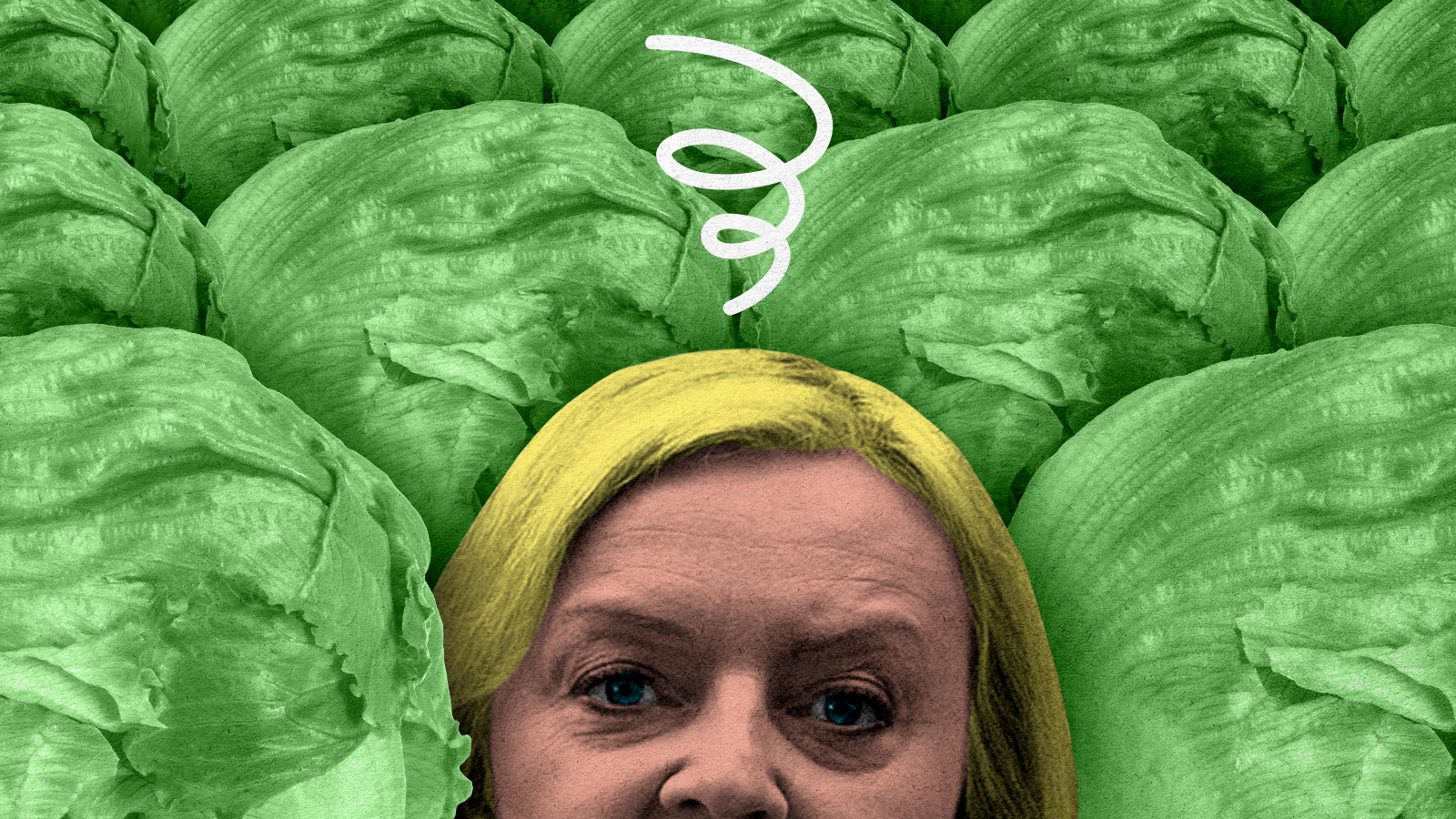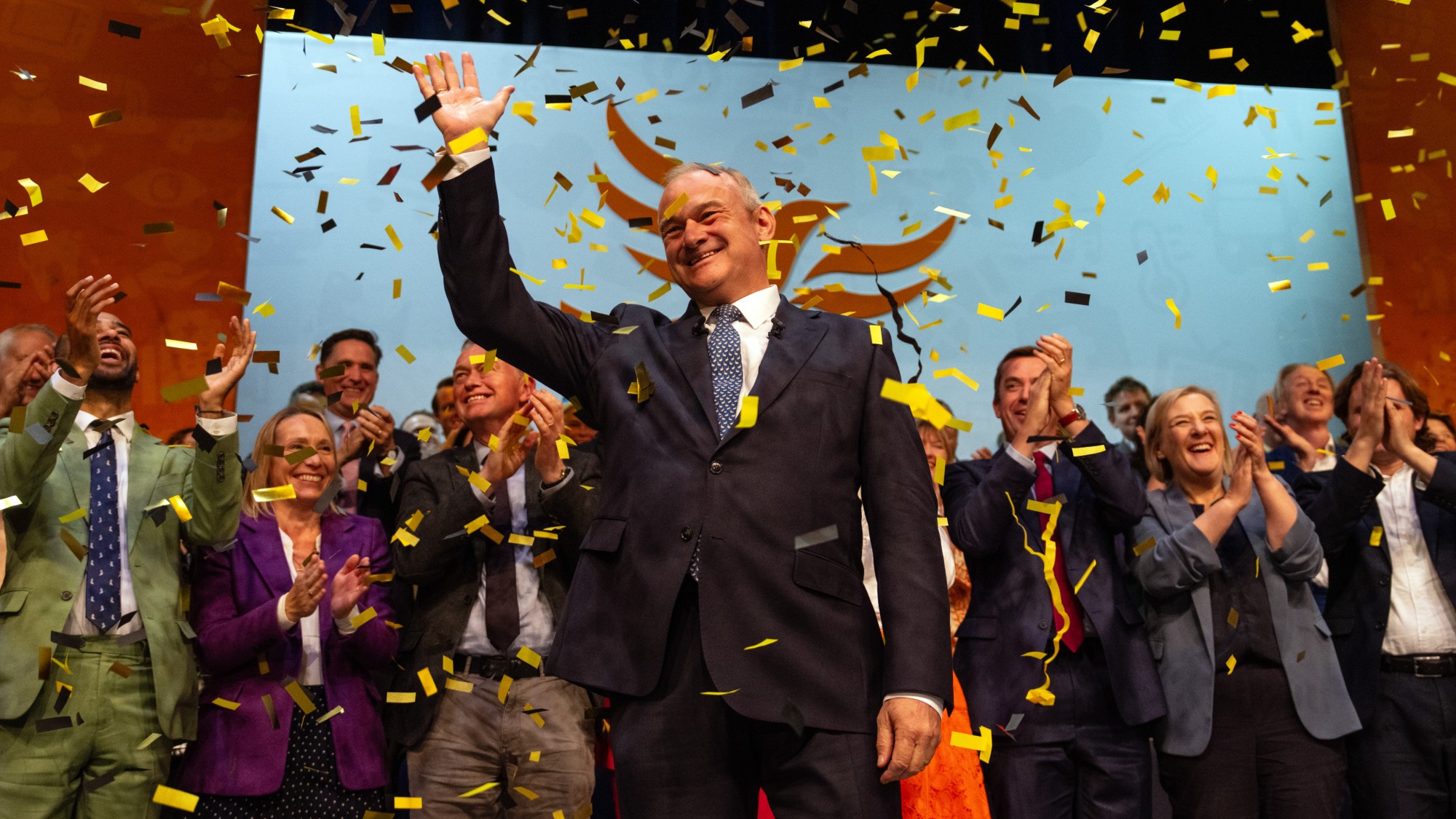Liz Truss' legacy
The sharpest opinions on the debate from around the web


A free daily email with the biggest news stories of the day – and the best features from TheWeek.com
You are now subscribed
Your newsletter sign-up was successful
U.K. Prime Minister Liz Truss will have a lasting legacy — but probably not the one she was hoping for.
Truss announced her resignation as prime minister last week amid mounting pressure and scathing criticism of her handling of the economy, ending her tenure after just 45 days and making her the shortest-serving prime minister in British history. Her resignation was hardly a surprise, especially given her plunging approval ratings — among the worst ever seen.
However, while many are blaming Truss for the unprecedented failure in office, is everything going wrong in the U.K. really her fault? Does the ex-prime minister simply represent the culmination of years of strife in one of the world's most important economies, or will her disastrous outing overshadow everything else that came beforehand and cement her legacy as a one-and-done failure?
The Week
Escape your echo chamber. Get the facts behind the news, plus analysis from multiple perspectives.

Sign up for The Week's Free Newsletters
From our morning news briefing to a weekly Good News Newsletter, get the best of The Week delivered directly to your inbox.
From our morning news briefing to a weekly Good News Newsletter, get the best of The Week delivered directly to your inbox.
Liz Truss took the worst actions at the worst time and has nobody to blame but herself
Some have said that Truss' own actions set her on a path to failure. Upon taking office, "Truss' plan to slash taxes, especially for the wealthiest, amounted to opening a firehose filled with gasoline into that raging economic fire," wrote CNN opinion contributor Frida Ghitis. She called Truss' controversial tax cut proposal a move "that threatened to send her country into an economic tailspin," and added that it made no sense to take such actions "in the midst of a wave of inflation that is battering the world."
Ghitis noted that many people both inside and outside of the U.K. felt that Truss did not have a concise plan for trying to fix her nation's economic woes. "Truss argues that cutting taxes will spur investment and growth," Ghitis wrote. "But even devout proponents of trickle-down economics know that slashing taxes when inflation stands at its highest levels in decades ... is like gorging on candy to prevent a diabetic coma."
Many agreed, including Faisal Islam, the economics editor for BBC News, who wrote in an op-ed that "Truss would still be prime minister had she not pushed ahead with the mini-budget, which caused her economic experiment, the entire basis of her leadership mandate, to fail in full view of the country and the world." Islam went on to say that Truss' advisors incorrectly believed the global markets "would simply ignore the massive £45 billion unfunded nature of her tax cuts," but instead "targeted British assets."
Liz Truss is among the worst prime ministers in British history
Given the failure of almost all of Truss' political agenda, contributor Martin Fletcher wrote in The New Statesman that Truss was among the worst prime ministers in the nation's history. In a blistering column, he described Truss as "inept, tin-eared, and seemingly devoid of any emotional intelligence, possessed of no mandate from the country or even her parliamentary party." Fletcher added that the prime minister had "arrogantly rebuffed all experts, all scrutiny, all warnings of catastrophe to pursue the chimera of economic growth ... through the sugar rush of huge, unfunded tax cuts for the rich at a time of acute economic hardship for everyone else."
A free daily email with the biggest news stories of the day – and the best features from TheWeek.com
The op-ed harshly criticized Truss' tax cuts as "ideological lunacy," and even suggested that, had Truss had her way, it could have led to "civil insurrection." Even as a self-described Conservative voter himself, Fletcher said that the disgraced prime minister had led her country "down a path of destruction that will blight the lives of generations to come."
"For the first time in my adult life, there is a genuine sense of decay in Britain — a realization that something has been lost that will be difficult to recover," Tom McTague, a staff writer for The Atlantic, wrote in a similar op-ed. "Today, we had the absurd spectacle of a prime minister, barely a month into the job, abandoning the central tax-cutting purpose of her premiership ... in aid of a vain and surely doomed attempt to cling to power, after the markets concluded that her policies were insane." He called the ongoing situation an "idiotic farce" and likened her plan to a booby trap in an Indiana Jones film, and predicted that she had nowhere to go but "political death."
Truss was thrust into a disastrous scenario and was set up for defeat
Despite the majority of columnists lambasting Truss, there are others still who feel that she was placed in an impossible scenario by her party. This includes Rosa Prince, editor of The House magazine, who wrote in an op-ed for CNN that the Conservative Party, "the most electorally successful party in British political history, is indeed battle-scarred, riven into multitudes of factions, and overhung with an air of bitterness."
Others further argued that Truss had inherited an economic crisis that couldn't be fixed, including Yasmeen Serhan, a staff writer for Time, who wrote on Truss' first day that the new prime minister was "beset with challenges that have been stewing over a long, anxious summer: A dire cost-of-living crisis that could see most Britons facing energy poverty, record-breaking inflation, a buckling healthcare system, widespread labor unrest, and an economy some say is already in recession." Gavin Barwell, a former Conservative minister, also told Serhan that the challenge Truss walked into "is one of the most difficult any prime minister has had in my lifetime."
Serhan also argued the domino effect that Truss would have, writing "the added challenge for Truss is that every decision she makes now will have knock-on effects on the other crises she faces." Serhan added, "This combination of crises would likely crush any prime minister — let alone one taking office against the wishes of the majority of her parliamentary colleagues."
Brexit and Boris Johnson are more to blame for Truss' downfall
Those that felt Truss was less personally responsible for the U.K.'s issues pointed to a wide array of other factors. One of the most commonly cited was Brexit and the country's longstanding issue with governance, with Jon Henley writing for The Guardian, "Continental observers have become used to Westminster meltdowns –— but many see in the latest cataclysm the inevitable finale of a project that was always divorced from reality."
This sentiment was echoed by French newspaper Libération, whose editorial board wrote that the Conservative Party was "on a path to total self-destruction." It seems many in France agreed with this analysis, with another newspaper, Le Monde, writing that Brexit was easily the number one cause of the current U.K. crisis.
Libération further argued that "Brexit, and its chief architect [former Prime Minister] Boris Johnson, have drained the Conservative Party of all substance and competence." The paper noted that Johnson was more to blame for the current situation given his significant push for Brexit that goes back years.
Time will tell how Truss' successor, Rishi Sunak, will fare as he attempts to rebuild the broken pieces of his country.
Justin Klawans has worked as a staff writer at The Week since 2022. He began his career covering local news before joining Newsweek as a breaking news reporter, where he wrote about politics, national and global affairs, business, crime, sports, film, television and other news. Justin has also freelanced for outlets including Collider and United Press International.
-
 Sepsis ‘breakthrough’: the world’s first targeted treatment?
Sepsis ‘breakthrough’: the world’s first targeted treatment?The Explainer New drug could reverse effects of sepsis, rather than trying to treat infection with antibiotics
-
 James Van Der Beek obituary: fresh-faced Dawson’s Creek star
James Van Der Beek obituary: fresh-faced Dawson’s Creek starIn The Spotlight Van Der Beek fronted one of the most successful teen dramas of the 90s – but his Dawson fame proved a double-edged sword
-
 Is Andrew’s arrest the end for the monarchy?
Is Andrew’s arrest the end for the monarchy?Today's Big Question The King has distanced the Royal Family from his disgraced brother but a ‘fit of revolutionary disgust’ could still wipe them out
-
 How ‘Manchesterism’ could change the UK
How ‘Manchesterism’ could change the UKThe Explainer The idea involves shifting a centralized government to more local powers
-
 What is at stake for Starmer in China?
What is at stake for Starmer in China?Today’s Big Question The British PM will have to ‘play it tough’ to achieve ‘substantive’ outcomes, while China looks to draw Britain away from US influence
-
 The billionaires’ wealth tax: a catastrophe for California?
The billionaires’ wealth tax: a catastrophe for California?Talking Point Peter Thiel and Larry Page preparing to change state residency
-
 Bari Weiss’ ‘60 Minutes’ scandal is about more than one report
Bari Weiss’ ‘60 Minutes’ scandal is about more than one reportIN THE SPOTLIGHT By blocking an approved segment on a controversial prison holding US deportees in El Salvador, the editor-in-chief of CBS News has become the main story
-
 UK, Colombia halt intel to US over boat attacks
UK, Colombia halt intel to US over boat attacksSpeed Read Both countries have suspended intelligence sharing with the US over the bombing of civilian boats suspected of drug smuggling
-
 Has Zohran Mamdani shown the Democrats how to win again?
Has Zohran Mamdani shown the Democrats how to win again?Today’s Big Question New York City mayoral election touted as victory for left-wing populists but moderate centrist wins elsewhere present more complex path for Democratic Party
-
 Millions turn out for anti-Trump ‘No Kings’ rallies
Millions turn out for anti-Trump ‘No Kings’ ralliesSpeed Read An estimated 7 million people participated, 2 million more than at the first ‘No Kings’ protest in June
-
 The Liberal Democrats: on the march?
The Liberal Democrats: on the march?Talking Point After winning their highest number of seats in 2024, can the Lib Dems marry ‘stunts’ with a ‘more focused electoral strategy’?
